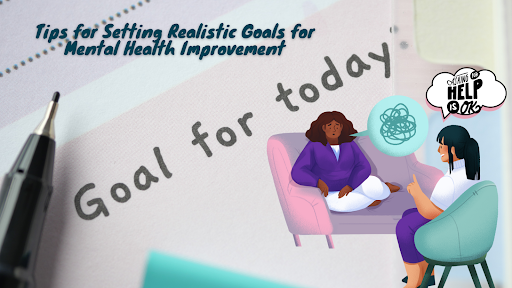Tips for Setting Realistic Goals for Mental Health Improvement

Deciding to work on improving your mental health is a brave and awesome thing to do. It’s a significant step toward living a happier, more satisfying life overall. One of the most powerful tools for making that happen is setting realistic goals for yourself. Having clear-cut goals helps you stay on track as you tackle challenges and enables you to celebrate victories along the journey.
This comprehensive guide will share some practical strategies for setting achievable mental health goals that work for you. Let’s break down how to make your goals specific and achievable, avoiding overly ambitious targets. Then, discuss practical steps you can take to reach those goals, paving the way for improved emotional well-being in your daily life. Sounds good? Let’s dive in and get you set up with a solid game plan.
Understand the Power of Mental Health Goals
Setting mental health goals isn’t just about wishful thinking, it’s a practical strategy for improving your overall well-being. These goals provide focus and direction allowing you to transform vague aspirations into tangible results. By understanding your needs and desires, you can set goals that resonate with your unique journey toward mental wellness.
Having clear goals helps bring clarity to your thoughts and emotions, making it easier to identify areas for improvement. Without a defined target, it’s easy to feel adrift and overwhelmed, unsure of where to direct your efforts.
Moreover, the act of setting goals triggers a psychological shift fostering a sense of purpose and determination. When you commit to specific objectives, you’re actively investing in your personal growth and well-being. This mindset empowers you to take ownership of your mental health rather than feeling like a passive bystander.
For some, taking a proactive approach to mental health may involve seeking professional support or resources to address specific challenges, like addiction. If you’re struggling with substance abuse, utilizing trustable addiction resources can be an empowering step toward reclaiming your well-being. Remember, asking for help is a sign of strength, not weakness.
Boost Confidence and Self-Esteem

Every goal achieved, no matter how small, serves as tangible proof of your ability to positively impact your mental state. This sense of accomplishment fosters a more positive self-image and a can-do attitude toward life’s challenges. Remember, progress matters more than perfection.
As you check off milestones on your mental health journey, you’ll experience a surge of pride and self-belief. These small victories serve as a reminder that you possess the resilience and determination to create meaningful change in your life.
Celebrating these achievements no matter how minor they may seem is crucial. It supports the idea that you have the power to shape your emotional well-being, boosting your confidence and self-esteem in the process.
According to Psychology Today, it’s important to celebrate small successes which help you to boost your self-confidence, and motivate you to keep going. Embrace each achievement as a stepping stone toward greater self-esteem and resilience.
Furthermore, setting and achieving mental health goals can help you cultivate a growth mindset. Rather than viewing challenges as insurmountable obstacles, you’ll begin to see them as opportunities for personal growth and self-improvement. This change in perspective can be incredibly empowering. This promotes a sense of self-efficacy and belief in your ability to overcome adversity.
By actively working toward your mental health goals, you’re investing in your personal growth and well-being. This proactive approach not only boosts your confidence and self-esteem but also equips you with the tools and strategies to navigate life’s challenges with greater resilience and inner strength.
Foster Accountability and Discipline
Put pen to paper and commit your goals to writing. This act of commitment becomes a powerful motivator, pushing you to take consistent actions. You’re responsible for your mental well-being, and recognizing your power to effect positive change is liberating.
A study by the Dominican University of California found that individuals who wrote down their goals were significantly more likely to achieve them than those who did not. Writing down your mental health goals fosters accountability and discipline, essential components for long-term success.
When you write down your goals, you’re making a tangible commitment to yourself. This simple act solidifies your intentions, making them feel more real and achievable. It’s a declaration of your dedication to improving your mental well-being, and it serves as a constant reminder of what you’re working towards.
Moreover, writing down your goals allows you to track your progress and celebrate your achievements along the way. As you check off each milestone, you’ll experience a sense of accomplishment that strengthens your commitment and motivates you to keep going.
Discipline is key when it comes to achieving your mental health goals. It’s easy to get sidetracked or lose momentum, especially when faced with setbacks or challenges. By writing down your goals, you create a roadmap that helps you stay focused and on track, even during difficult times.
Involving others in your goal-setting process can further enhance accountability. Share your written goals with a trusted friend, family member, or mental health professional. This accountability partner can offer support, encourage you when you feel discouraged, and celebrate your victories with you.
Additionally, consider setting reminders or creating a visual representation of your goals such as a vision board or a chart. These reminders can help keep your goals top-of-mind and reinforce your commitment to achieving them.
Remember, fostering accountability and discipline is not about self-criticism or harsh self-judgment. It’s about taking ownership of your mental well-being and equipping yourself with the tools and strategies to create lasting change. By committing your goals to writing and embracing accountability, you’re empowering yourself to navigate the journey toward emotional wellness with focus and determination.
Proactive Empowerment: Take Charge of Your Life
Setting and working toward mental health goals actively shapes your emotional world. Instead of merely reacting to external circumstances, you become the architect of your own well-being. This proactive approach empowers you, making you feel more in control and less at the mercy of life’s twists and turns.
When you adopt a reactive mindset, you risk feeling like a passive bystander in your own life. External factors, such as stress, relationships, or work demands, can dictate your emotional state, leaving you feeling helpless and overwhelmed. However, by being proactive and setting mental health goals, you reclaim your power and agency.
Proactivity means taking intentional steps toward creating the life and emotional well-being you desire. It’s about identifying areas that need improvement and actively working towards positive change. This mindset shift can be incredibly liberating, as you realize that you can shape your own narrative and navigate challenges with greater confidence and resilience.
Moreover, being proactive in your mental health journey fosters a sense of personal responsibility and self-efficacy. You’re no longer waiting for circumstances to change or relying solely on external factors for your happiness and well-being. Instead, you’re taking purposeful actions to cultivate a healthier, more fulfilling emotional state.
By setting and working towards mental health goals, you’re actively investing in your personal growth and emotional well-being. This proactive mindset not only empowers you to overcome obstacles but also equips you with the tools and strategies to navigate life’s challenges with greater resilience and inner strength.
Step-by-Step Guide to Setting Mental Health Goals
Now that you understand the power of mental health goals, let’s dive into a step-by-step guide to help you set realistic and achievable targets.
- Identify the Details of What You Want to Change: Be specific. What aspects of your mental health need improvement? Is it managing anxiety, boosting your mood, or building stronger relationships?
- Get SMART About Your Ideas: Make your goals Specific, Measurable, Achievable, Relevant, and Time-bound (SMART). Breaking them down into smaller steps can help avoid feeling overwhelmed.
- Create an Action Plan: Fit these changes into your daily life. Consistency is key. Whether it’s practicing mindfulness, engaging in physical activity, or seeking professional help, create a plan that works for you.
- Write Your Goals Down: Putting your goals in writing keeps your motivation levels up. It also reinforces your commitment to achieving them.
- Invite Support: Share your goals with someone you trust. Having a support system increases accountability and encourages you to stay on track.

According to the American Psychological Association, setting SMART goals can significantly increase the likelihood of achieving them. By following this step-by-step approach, you’ll be well on your way to crafting realistic and attainable mental health goals.
Comparison Table: Traditional vs. SMART Goal-Setting
To help you visualize the differences between traditional and SMART goal-setting, here’s a comparison table:
| Traditional Goal-Setting | SMART Goal-Setting |
| Vague and non-specific | Specific and well-defined |
| Unmeasurable | Measurable with clear milestones |
| Unrealistic or overly ambitious | Achievable and realistic |
| Irrelevant or lacking purpose | Relevant and aligned with values |
| Open-ended or without a timeline | Time-bound with a target date |
By adopting the SMART approach, you increase the likelihood of setting realistic and achievable mental health goals, setting yourself up for success.
Cultivating Resilience and Coping Strategies
Resilience and effective coping mechanisms are essential components of a well-rounded mental health plan. Here’s how you can incorporate them into your goal-setting journey:
Identify the specific stressors that impact your mental health. Recognize patterns and triggers, whether they’re related to work, relationships, or personal circumstances. By understanding what influences your emotional state, you can develop targeted coping strategies.
Explore healthy coping mechanisms that resonate with you. These might include deep breathing exercises, journaling, or engaging in hobbies. Find what works best and integrate it into your daily routine. According to the Centers for Disease Control and Prevention (CDC), practicing healthy coping mechanisms can significantly improve mental well-being.
Nurturing Emotional Intelligence
Emotional intelligence is a crucial aspect of mental health and personal growth. By nurturing this skill, you can better navigate the complexities of life and cultivate resilience.
Self-Reflection and Emotional Awareness
Regularly pause and reflect on your emotions. Understand their origins and how they influence your thoughts and behaviors. Emotional awareness empowers you to respond thoughtfully rather than react impulsively.
Cultivating self-reflection and emotional awareness is a powerful tool for personal growth and mental well-being. When you can identify and understand your emotions, you gain valuable insights into your motivations, triggers, and patterns of behavior. This boosted self-awareness allows you to make more mindful choices and respond to situations in a way that aligns with your values and goals.
Empathy and Compassion
Practice empathy toward yourself and others. Cultivate compassion by acknowledging shared human experiences. This fosters connection and reduces feelings of isolation. According to the Greater Good Science Center at UC Berkeley, practicing empathy and compassion can improve mental health and overall well-being.
Empathy is the ability to understand and share the feelings of others. By actively practicing empathy, you can build stronger, more meaningful connections with the people in your life. This sense of connection and understanding can provide a powerful source of support and comfort, particularly during challenging times.
Balancing Digital Well-Being
In our digital generation, it’s essential to keep a balance between technology and our mental health. While technology can be a powerful tool for connection, information, and entertainment, excessive or unhealthy use can negatively impact our emotional well-being. Achieving a healthy relationship with digital devices and platforms is crucial for maintaining a balanced and fulfilling life.
Set Boundaries with Technology
Limit screen time, especially before bedtime. Create tech-free zones in your home to disconnect and recharge. According to the American Psychological Association, excessive screen time can contribute to increased stress, anxiety, and other mental health issues.
Establishing boundaries with technology is an important step in promoting digital well-being. When we’re constantly connected to our devices, it can be challenging to truly unwind and disconnect from the stressors of daily life. By setting limits on screen time and creating designated tech-free spaces or periods, we allow ourselves to fully engage with the present moment and cultivate a sense of mindfulness.
Mindful Social Media Use
Be purposeful about your social media consumption. Unfollow accounts that trigger negative emotions and curate your feed to inspire and uplift. Research by the University of Pennsylvania found that limiting social media use can lead to significant improvements in well-being.
Social media can be a double-edged sword when it comes to mental health. By being mindful of the content you consume and the accounts you follow, you can create a more positive and uplifting digital environment.
Engage with social media in a way that aligns with your values and goals. Follow accounts that inspire you, share valuable information, or provide a sense of community. Additionally, be mindful of the time you spend on social media platforms. Set limits or use tools to track your usage, and make a conscious effort to engage in more fulfilling activities such as pursuing hobbies, spending time with loved ones, or engaging in physical activity.
Frequently Asked Questions
How often do you check in with yourself mentally?
Regular self-assessment is essential for maintaining mental well-being. Consider setting aside time each week to reflect on your emotional state and any changes you’ve noticed.
Have emotional or mental health challenges affected your relationships?
Mental health impacts our interactions with others. Explore how your emotional well-being influences your connections with family, friends, and colleagues.
What steps could you take to improve your mental well-being?
Encourage readers to brainstorm actionable steps. Whether it’s practicing mindfulness, seeking therapy, or connecting with a support group, personalized strategies matter.
Do you feel like you’ve been prioritizing your mental health lately?
Prioritization is key. Remind readers that self-care isn’t selfish, it’s necessary for overall health. Encourage them to assess their current priorities.
How comfortable do you feel saying no to things that don’t serve you?
Boundaries play a crucial role in mental health. Teach readers that saying no is an act of self-compassion and a way to protect their well-being.
What role does gratitude play in mental health goal-setting?
Gratitude practices enhance mental well-being. Explore techniques like keeping a gratitude journal or expressing appreciation to others.
How can I maintain motivation when working toward mental health goals?
Motivation can wane over time. Share strategies such as visualizing success, celebrating progress, and seeking inspiration from others.
What if my mental health goals change over time?
Flexibility is essential. Encourage readers to adapt their goals as needed. Life circumstances evolve, and so should our mental health aspirations.
How can I involve loved ones in my mental health journey?
Social support matters. Discuss ways to communicate with family and friends about your goals, seek their encouragement, and share progress.
What if setbacks occur while pursuing mental health goals?
Setbacks are normal, reminding readers that resilience lies in how we handle setbacks. Encourage self-compassion and a commitment to keep moving forward.
Similar Posts:
- Why Is It Important to Keep Your Mental Health in Check?
- Balancing Motherhood and Wellness: A Holistic Approach to Postpartum Recovery
- 10 Things Expecting Parents Should Know About Pregnancy
- Self-Care For Moms: Practical Tips To Manage And Alleviate Anxiety
- Are You or a Loved One Battling Addiction? How Moms Can Find Help and Hope









